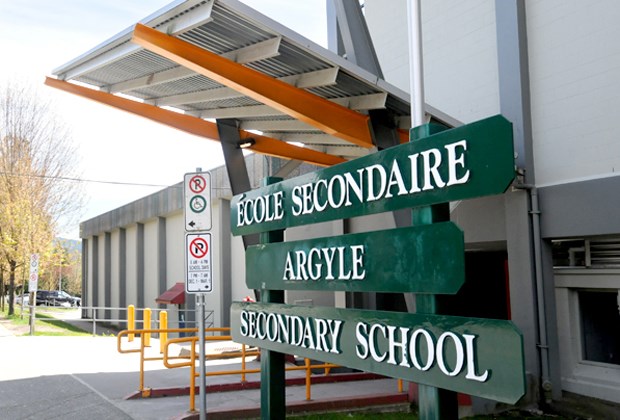Argyle secondary could be getting a complete rebuild if the Ministry of Education gives the project the green light.
The North Vancouver Board of Education voted on Tuesday night in favour of a complete rebuild of the school over seismic upgrades. The estimated cost of a full rebuild, originally estimated at $46 million, has jumped to almost $50 million, while a seismic upgrade only would be $35 million. The school board will now be on the hook for the $15 million difference in cost and has applied to the province to borrow that money, along with approval for the full rebuild.
The costs could increase even more if the project is approved.
Georgia Allison, secretary treasurer for the North Vancouver school district, said the current numbers are preliminary and the project needs to go through various steps to narrow down the full replacement cost.
"The Ministry of Education has clearly stated that any differential between a seismic project and capital replacement project must be funded by the school district," said Allison. "The ministry has further indicated that the school district will need to present a plan that identifies how this funding will be generated,
have a valid measure of the funds to be generated and an achievable plan."
In May 2012 the Ministry of Education made the decision to support seismic upgrades of Argyle secondary and there has been debate since as to whether to upgrade the aging structure or completely rebuild it. According to a report presented to the board Monday night, even if the province paid for a seismic upgrade, the school district could still be left spending approximately $18 million over the next 20 years to upgrade other parts of the school.
The board is hoping to repay the $15 million loan through future land sales and leases, or other land dispositions. If approved by the province, the loan would have to be repaid by no later than June 30, 2023.
"The ministry has indicated that they want to see what our plan for repayment would be," said Allison.
"There is a real push by the ministry to recapture any debt from operating funds from school districts already and they are doing that on a very short timeline. This is capital, they do recognize it takes longer to generate the capital for it, but they won't be looking for a long-term loan. I would expect that 10 years is probably as long as they'll go."
Though the board is currently asking for up to $15 million, some trustees questioned whether the district should ask for $20 million instead.
Lisa Bayne, board trustee, said that although $20 million is a large sum, the board would not necessarily have to spend it.
"I would rather see a higher number and have the flexibility rather than have to go back to the ministry or scramble to try and figure out where we're going to come up with another $3 (million) or $4 million or $200,000 or whatever it is that we're over," said Bayne.
But John Lewis, North Vancouver superintendent of schools, said estimated costs already take into account possible increases.
"I think we're comfortable with the $15 million figure as the maximum," he said.
Board chairwoman Franci Stratton said the board would be using the ministry's funding first before considering borrowing any more money.
"That could be a few years down the road before we have to borrow," she said.



